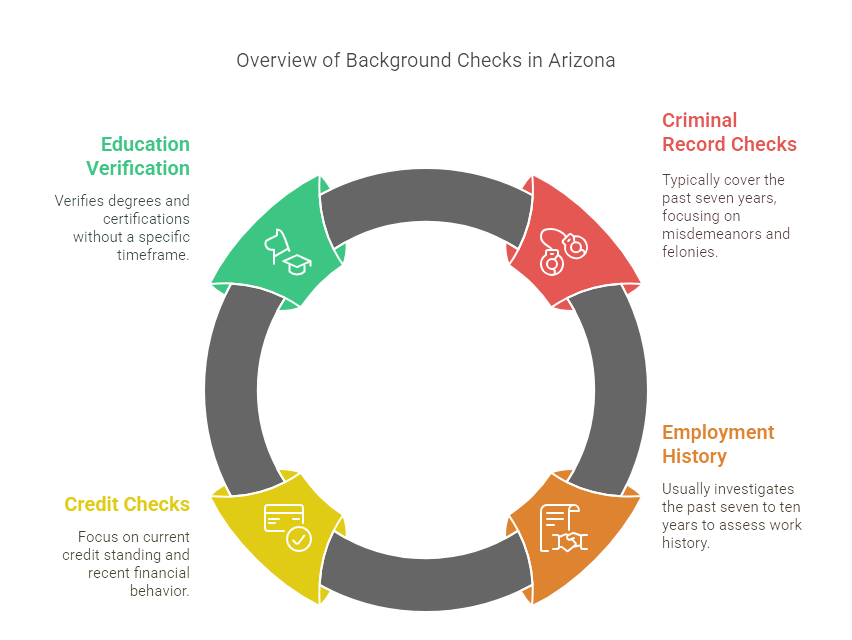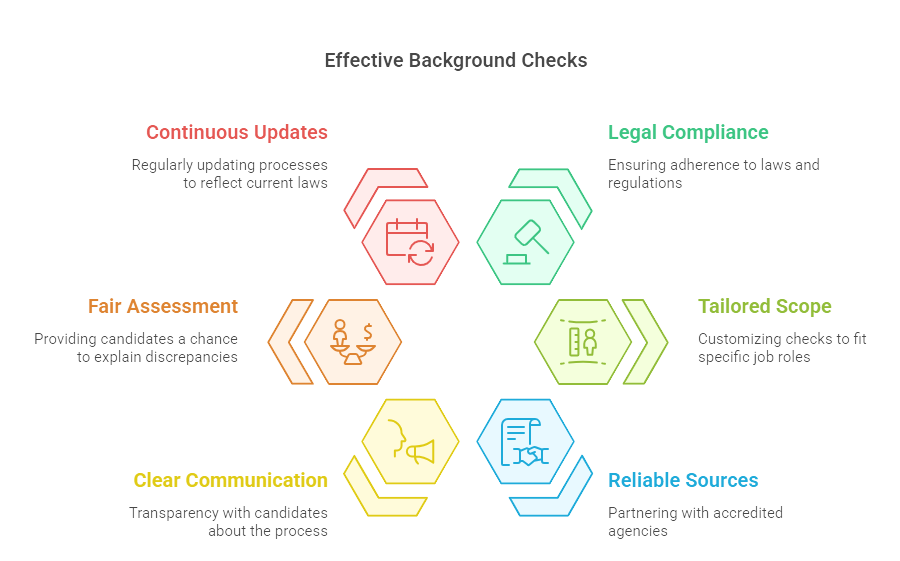Understanding how background checks work is crucial for both job seekers and employers. If you're applying for a job in Arizona or hiring someone, knowing the specifics of how far back background checks go can save time and potential legal complications. This guide will explore the ins and outs of background checks in Arizona, focusing on how far back these checks can reach, relevant laws, and practical insights for employers.
Key Takeaways
- Background checks are crucial in Arizona's job market due to its unique legal landscape and state-specific regulations.
- Arizona adheres to the Fair Credit Reporting Act (FCRA) guidelines, with no specific state-imposed time limits on background checks, though criminal convictions may be reported indefinitely.
- Common background check types in Arizona include criminal record, employment history, credit checks, and education verification, each with specific look-back durations and criteria.
- Employers conducting background checks must comply with both federal and state legal requirements, ensuring applicants' rights to consent, review, and dispute are upheld.
- Employers are advised to tailor checks to job roles, use reliable sources, communicate transparently with candidates, and stay informed on legal updates to ensure compliance and fair assessment.
Introduction
In today's competitive job market, background checks have evolved into a quintessential part of the hiring process. Whether you're an employer aiming to secure trustworthy talent or a job seeker eager to join the workforce, understanding how these checks function in Arizona is essential. This topic holds particular relevance in Arizona due to its unique legal landscape and regulatory specifics. In this guide, we'll uncover the mysteries of background checks in Arizona, clarifying how long they typically stretch into one's past, what aspects they cover, and the nuances of relevant state and federal laws. By the end, readers will gain a firm grasp on what employers can delve into legally and how job applicants can prepare effectively.
EXPERT INSIGHT: I've found, through my experience in talent acquisition and recruitment, that background checks are not a checkbox, but are a moment of truth that can decide a person’s future. I've encountered excellent candidates who were more than their past, and I've encountered leaders who would not hire cautiously, but would hire equitably. Because of that, having a true understanding of how background checks are actually performed, especially in a state like Arizona, makes a real difference. It’s not about mitigating risk—it’s about making room for growth, redemption, and openness. That’s what I’ve tried to do in this guide: bring employers and applicants together in that space in a well-informed, empathetic way. - Charm Paz, CHRP
Arizona Background Check Laws
In Arizona, background checks follow not just common sense but also a strict legal framework. While the federal Fair Credit Reporting Act (FCRA) sets the stage by regulating how consumer information is used, Arizona's own statutes add another layer of rules tailored to the state's unique landscape.
Arizona doesn't impose a specific time limit for how far back background checks can look, but it adheres to the FCRA's standard: consumer reports generally may not include negative information older than seven years, except for criminal convictions. Employers in Arizona should be fully aware of these limitations to avoid landing in legal quicksand.
For those wanting a deep dive into the specifics, reading up on resources like "Arizona Background Check Laws" could be enlightening. The gist? Make sure you're not only thorough but also compliant.
When conducting background checks, Arizona businesses should be meticulous. Yes, ensure you're getting the full story, but remember to keep your methods aboveboard. Check and recheck that you're not brushing up against FCRA limits or state-specific rules. Non-compliance isn't just a faux pas; it's a risk to your business.
How Far Back Do Background Checks Go in Arizona?
In Arizona, the duration for various background checks can differ based on the type. For criminal record checks, the standard period typically extends to seven years. This applies to both misdemeanors and felonies as per the guidelines set by the Fair Credit Reporting Act (FCRA). However, it's essential to note that certain positions, especially those of a sensitive or high-level nature, might necessitate a check that goes beyond this standard period, sometimes up to ten years or more.
Employment history checks generally adhere to a seven-year rule, too, although there's flexibility depending on the employer's requirements and the nature of the industry. For instance, sectors like finance or those involving security clearance may delve deeper into an applicant’s past.
Credit checks, commonly conducted for positions that involve financial responsibility, are also usually capped at seven years. However, these are less frequently required outside of specific roles like accounting or banking.
Several factors can influence the look-back period. For instance, the level of responsibility attached to the job, any relevant federal or state laws, and industry practices can play a significant role in determining how far back a background check may reach. Employers should always weigh the necessity of extensive background checks against the potential for discrimination claims or privacy concerns.
Types of Background Checks and Their Durations
When it comes to background checks in Arizona, understanding the duration each type might cover is key for both employers and job seekers. Here's a quick rundown of the common types and how far back they typically go.
Criminal Record Checks
Criminal background checks are the most commonly scrutinized. In Arizona, these often reach as far back as seven years. This standard timeframe generally includes both misdemeanors and felonies. However, for certain positions, especially those in security or childcare, employers might look even further back due to specific legal requirements or company policy.
Employment History
Verification of past employment has its own rhythm. Typically, employers investigate the past seven to ten years. This helps them assess consistent work history and determine the applicant's level of experience. However, the depth may vary, especially for high-level or specialized positions that demand thorough vetting of previous roles and responsibilities.
Credit Checks
Credit checks usually don’t have a set timeframe like a decade or seven years but rather focus on current credit standing and recent financial behavior. While these aren't standard for all jobs, they show up frequently in finance or positions involving fiduciary responsibility. In Arizona, the relevance of credit history is balanced carefully with the job's nature to avoid unnecessary discrimination.
Education Verification
Education background checks target qualifications and credentials. Unlike other checks, there's generally no "expiration date" on your education. So employers may verify degrees and certifications from any point in the applicant's career. This ensures claims of educational attainment are accurate, crucial for roles requiring specific expertise or higher education criteria.
In a world where details matter, knowing the scope and limitations of these checks helps both employers conduct due diligence and applicants present themselves accurately. Understanding this landscape aligns expectations with reality, making the hiring process smoother for all involved.

Legal Considerations and Compliance
Navigating the legal landscape of Arizona background checks requires understanding federal and state requirements. The Fair Credit Reporting Act (FCRA) is the primary federal law that dictates how background checks should be conducted. It includes the stipulation that employers must obtain written consent from job applicants before conducting a check. The FCRA also ensures that applicants have the right to a copy of their report and the opportunity to dispute any inaccuracies found.
In Arizona, expunged or sealed records typically do not appear in background checks. Arizona law allows individuals to petition the courts to have certain offenses set aside, which can help prevent them from affecting employment opportunities. Employers should know that accessing or using expunged information can lead to legal challenges.
For job applicants, knowing your rights is crucial. You have the right to be informed if a background check will be used to make employment decisions, the right to consent, and the right to review the results. If adverse action is taken based on the findings, employers must notify you, provide a copy of the report, and explain your rights to dispute any inaccuracies. Understanding these protections can empower applicants to address any issues proactively during the hiring process.
Practical Tips for Employers
Conducting thorough background checks is key for employers aiming to make informed hiring decisions. Here’s how to navigate the process effectively:
- Know Your Limits: Familiarize yourself with all relevant laws, keeping the Fair Credit Reporting Act (FCRA) in mind, and ensure your checks align with Arizona-specific regulations. This will help avoid legal pitfalls.
- Tailor Your Checks: Customize the scope of your checks to fit the role. For example, more comprehensive screenings may be necessary for positions with financial or security responsibilities, while others might require just a basic review.
- Use Reliable Sources: Partner with accredited background check agencies, and ensure they’re compliant with regulations. This not only enhances accuracy but also credibility.
- Communicate Clearly: Be transparent with candidates about the background check process. Inform them of what will be checked and why it is relevant to the position they’re applying for.
- Handle Discrepancies with Care: If a red flag appears, provide the candidate with a chance to explain. Fair assessment helps maintain trust and might reveal misunderstandings rather than dishonesty.
- Stay Updated: The realm of background checks is dynamic. Regularly update your screening processes to reflect current laws and best practices. This proactive approach will keep your hiring procedures both legal and effective.
For more detailed strategies on conducting compliant background checks, refer to resources like the FTC’s guidance. Remember, the goal is to protect your business while also respecting applicant rights.

Conclusion
To wrap it up, understanding how far back background checks go in Arizona is fundamental for maintaining compliance and making informed decisions during the hiring process. For employers, staying updated on the nuances of state regulations and the Fair Credit Reporting Act is crucial. Comprehending the typical durations for various checks—be it criminal records, employment history, or credit checks—can help align expectations and actions with legal standards. For job seekers, awareness of these details can provide clarity and empower them to safeguard their rights. Regardless of which side of the table you're on, an informed approach ensures smoother interactions and reduced risks in the job market landscape of Arizona.
Frequently Asked Questions
How far back can employers look in Arizona background checks?
In Arizona, employers can typically look back seven years for most types of background checks, in accordance with the Fair Credit Reporting Act (FCRA). However, there are exceptions that may extend this period, especially for roles involving higher responsibility or financial oversight.
Does Arizona have a 7-year limit on background checks?
Yes, Arizona generally follows the 7-year limit for background checks as set by the FCRA, which restricts the reporting of civil suits, civil judgments, records of arrest, and other similar adverse information older than seven years. However, certain conditions and roles may warrant a longer look-back period.
Are there exceptions to the 7-year rule in Arizona?
Yes, exceptions to the 7-year rule exist, particularly for roles with salaries above a certain threshold or that involve security clearance, high financial responsibility, or working with vulnerable populations. In these cases, employers may be permitted to conduct a background check that extends beyond the standard seven years.
What shows up on an Arizona background check?
An Arizona background check can show criminal history, credit history, employment verification, education records, and driving records. Specific checks may vary depending on the employer's requirements and the nature of the job. Felony and misdemeanor convictions generally appear, along with any pending charges.
How long do felony convictions stay on a background check in Arizona?
Felony convictions in Arizona can appear on a background check indefinitely unless legally expunged, sealed, or set aside. Unlike the general 7-year limit for certain background information, felony convictions do not automatically expire and can be considered by employers indefinitely unless modified by court action.
Can misdemeanors be removed from Arizona background checks?
Misdemeanors can potentially be removed from background checks if they are set aside or expunged through a legal process. Individuals must petition the court to have their misdemeanor convictions set aside. Once granted, this could alter how these convictions appear in background checks, though they might still be visible in certain circumstances.
Resources
U.S. Equal Employment Opportunity Commission. (2012). Enforcement Guidance on the Consideration of Arrest and Conviction Records in Employment Decisions Under Title VII of the Civil Rights Act of 1964. Retrieved from https://www.eeoc.gov/laws/guidance/arrest_conviction.cfm
National Conference of State Legislatures. (n.d.). Background Checks. Retrieved from https://www.ncsl.org/research/labor-and-employment/background-checks.aspx
Federal Bureau of Investigation. (n.d.). Background Checks. Retrieved from https://www.fbi.gov/services/cjis/nics/background-checks
Arizona State Legislature. (n.d.). Title 41, Chapter 6, Article 7.1. Retrieved from https://www.azleg.gov/arsDetail/?title=41&chapter=6&article=7.1

GCheck Editorial Team
Meet the GCheck Editorial Team, your trusted source for insightful and up-to-date information in the world of employment background checks. Committed to delivering the latest trends, best practices, and industry insights, our team is dedicated to keeping you informed.
With a passion for ensuring accuracy, compliance, and efficiency in background screening, we are your go-to experts in the field. Stay tuned for our comprehensive articles, guides, and analysis, designed to empower businesses and individuals with the knowledge they need to make informed decisions.
At GCheck, we're here to guide you through the complexities of background checks, every step of the way.






